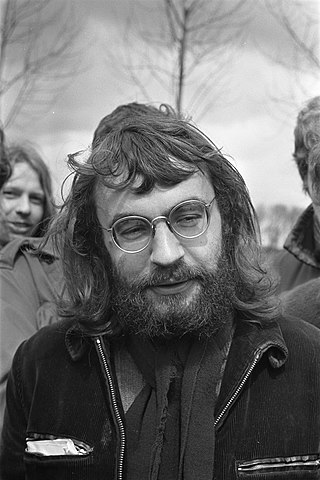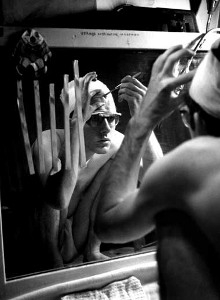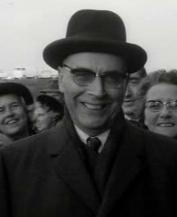
Syndicalism is a revolutionary current within the labor movement that, through industrial unionism, seeks to unionize workers according to industry and advance their demands through strikes, with the eventual goal of gaining control over the means of production and the economy at large through social ownership. Developed in French labor unions during the late 19th century, syndicalist movements were most predominant amongst the socialist movement during the interwar period that preceded the outbreak of World War II.
Tomorrow were an English musical group active in the 1960s, whose music touched on psychedelic rock, pop and freakbeat. Despite critical acclaim and support from DJ John Peel, who featured them on his "Perfumed Garden" radio show, the band was not a great success in commercial terms. They were among the first psychedelic bands in England, along with Pink Floyd and Soft Machine. Tomorrow recorded the first John Peel show session on BBC Radio 1 on 21 September 1967. The band included Keith West of "Excerpt from A Teenage Opera" fame on vocals and Steve Howe on guitars, who would later join the British progressive rock band Yes.

Amsterdam has a long and eventful history. The origins of the city lie in the 12th century, when fishermen living along the banks of the River Amstel built a bridge across the waterway near the IJ, which at the time was a large saltwater inlet. Wooden locks under the bridge served as a dam protecting the village from the rising IJ waters, which often flooded the early settlement. The mouth of the river Amstel, where the Damrak is now, formed a natural harbor, which became important for trading-exchange from the larger koggeships into the smaller ships that sailed the merchandise deeper into the hinterland.

The Political Party of Radicals was a Christian-radical, progressive Christian and green political party in the Netherlands. The PPR played a relatively small role in Dutch politics and merged with other left-wing parties to form GreenLeft in 1991.

Roeland Hugo Gerrit (Roel) van Duijn is a Dutch politician, political activist and writer. He was a founder of Provo and the Kabouterbeweging. He was alderman for the Political Party of Radicals and later wardcouncillor for the GreenLeft.

The Social Democratic Workers' Party was a Dutch socialist political party existing from 1894 to 1946, and a predecessor of the social democratic Labour Party.

Laurens (Luud) Maria Hendrikus Schimmelpennink is a Dutch social inventor, industrial designer, entrepreneur and politician. As of 2007 he is Managing Director of the Ytech Innovation Centre in Amsterdam. Schimmelpennink first came into public view in the early 1960s through his association with the Dutch Provo counterculture and the White Bicycle Plan.

Anarchism was an influential contributor to the social politics of the First Brazilian Republic. During the epoch of mass migrations of European labourers at the end of the nineteenth and the beginning of the twentieth century, anarchist ideas started to spread, particularly amongst the country’s labour movement. Along with the labour migrants, many Italian, Spanish, Portuguese and German political exiles arrived, many holding anarchist or anarcho-syndicalist ideas. Some did not come as exiles but rather as a type of political entrepreneur, including Giovanni Rossi's anarchist commune, the Cecília Colony, which lasted few years but at one point consisted of 200 individuals.

Anarchism in Ireland has its roots in the stateless organisation of the tuatha in Gaelic Ireland. It first began to emerge from the libertarian socialist tendencies within the Irish republican movement, with anarchist individuals and organisations sprouting out of the resurgent socialist movement during the 1880s, particularly gaining prominence during the time of the Dublin Socialist League.

Hugo Bart Huges was a Dutch librarian and proponent of trepanation. He attended medical school at the University of Amsterdam, but was refused a degree due to his advocacy of LSD research and naming his daughter "Maria Juana". In 1964 he published "The Mechanism of Brainbloodvolume ('BBV')", a scroll in which he proposed that trepanation could be used to enhance brain functionality by balancing the proportion of blood and cerebral spinal fluid. Huges believed that, when mankind began to walk upright, our brains drained of blood and that trepanation allowed the blood to better flow in and out of the brain, causing a permanent "high". Using a foot-operated electric dentist drill, Huges drilled a hole in his skull on 6 January 1965. He also published "Trepanation: A Cure for Psychosis", in which he expanded upon his theory, and an autobiography, The Book With The Hole, in 1972.
"My White Bicycle" is a song written by Keith West and Ken Burgess. It was Tomorrow's debut single.
Alexander "Sanya" Moiseyevich Schapiro or Shapiro was a Russian anarcho-syndicalist activist. Born in southern Russia, Schapiro left Russia at an early age and spent most of his early activist years in London.

Bicycle use in Portland, Oregon has been growing rapidly, having nearly tripled since 2001; for example, bicycle traffic on four of the Willamette River bridges has increased from 2,855 before 1992 to over 16,000 in 2008, partly due to improved facilities. The Portland Bureau of Transportation says 6% of commuters bike to work in Portland, the highest proportion of any major U.S. city and about 10 times the national average.

Robert Jasper Grootveld was a Dutch artist, best known for his events on the Spui in Amsterdam. Grootveld's 'happenings' were a forerunner of the Provo movement, which he later joined.

Gijsbert van Hall was a Dutch banker, resistance member and senator. He was Mayor of Amsterdam between 1957 and 1967.
A general strike is a strike action in which participants cease all economic activity, such as working, to strengthen the bargaining position of a trade union or achieve a common social or political goal. They are organised by large coalitions of political, social, and labour organizations and may also include rallies, marches, boycotts, civil disobedience, non-payment of taxes, and other forms of direct or indirect action. Additionally, general strikes might exclude care workers, such as teachers, doctors, and nurses.

The Pinksterlanddagen is the largest anarchist event in the Netherlands. It is a long tradition that goes back to 1924 when anarchist young people from Frisia organized this meeting for the first time. In 1933, the campground in Appelscha was bought by anti-militarist workers, and it is here that the festival has taken place ever since, every year during the Pentecost on the anarchist, alcohol-free camping site Tot Vrijheidsbezinning.
Anarchism in the Netherlands originated in the second half of the 19th century. Its roots lay in the radical and revolutionary ideologies of the labor movement, in anti-authoritarian socialism, the free thinkers and in numerous associations and organizations striving for a libertarian form of society. During the First World War, individuals and groups of syndicalists and anarchists of various currents worked together for conscientious objection and against government policies. The common resistance was directed against imperialism and militarism.

Anarchism in Indonesia has its roots in the anti-colonial struggle against the Dutch Empire. It became an organized movement at the behest of Chinese anarchist immigrants, who played a key part in the development of the workers' movement in the country. The anarchist movement was suppressed, first by the Japanese occupation of the Dutch East Indies, then by the successive regimes of Sukarno and Suharto, before finally re-emerging in the 1990s.














